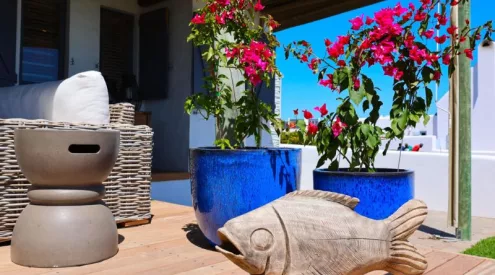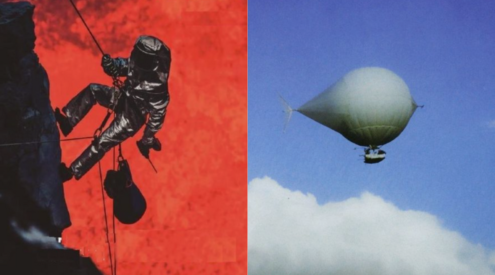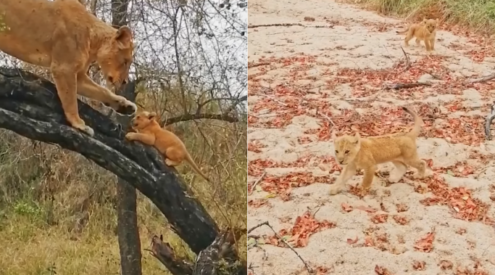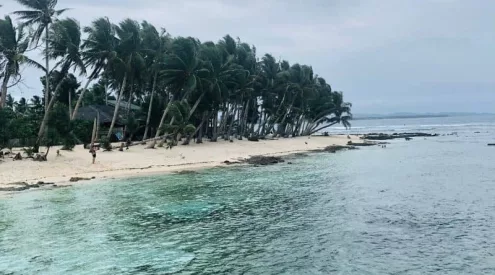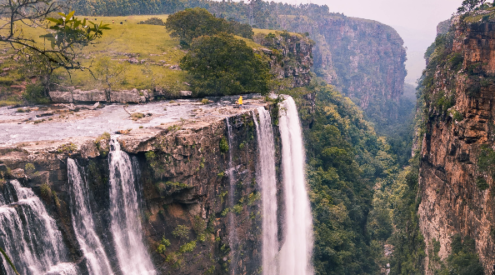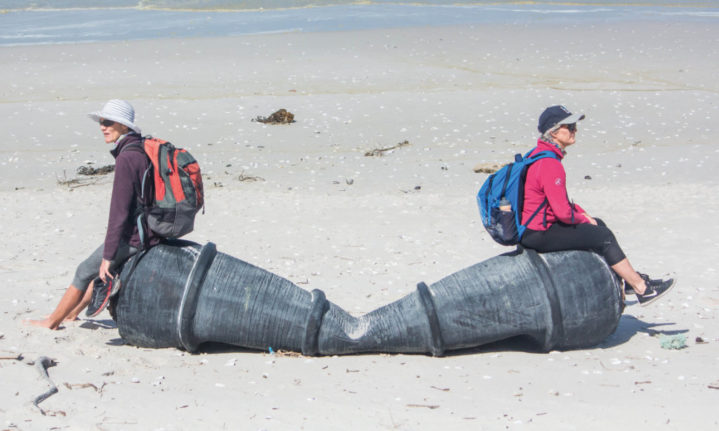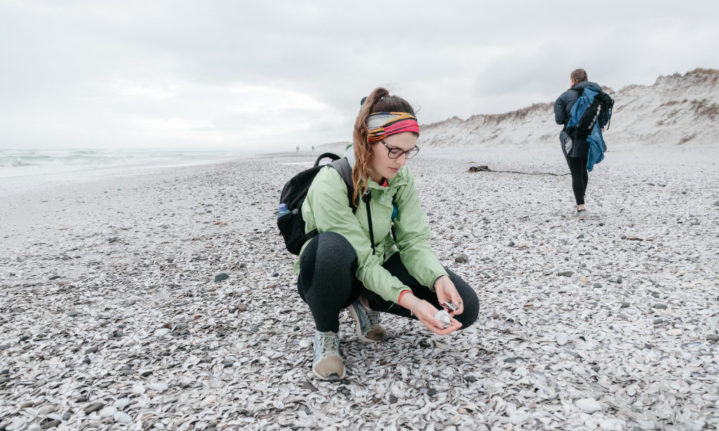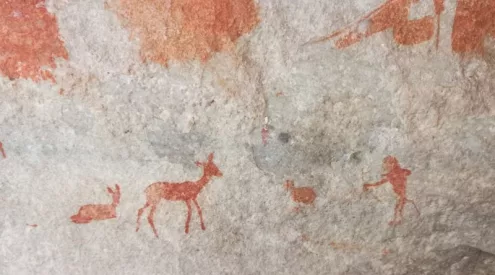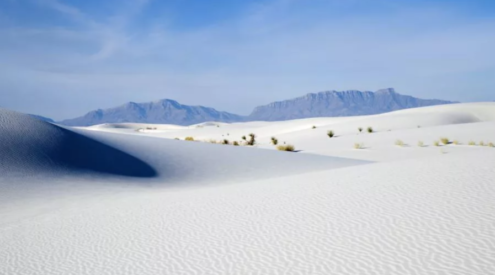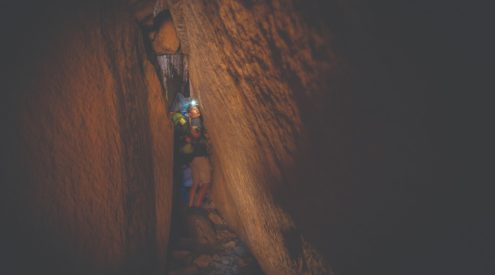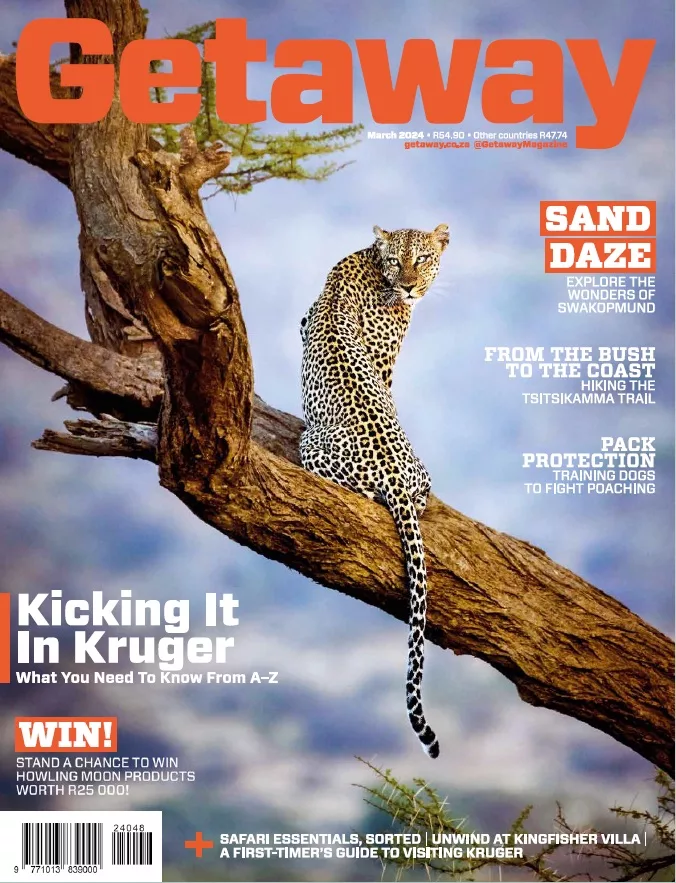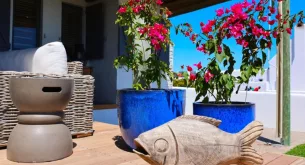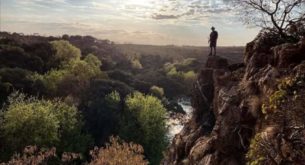A new guided hike in the Western Cape known as the 16 Mile Beach Challenge offers a rigorous day’s hike along the coast with uninterrupted stretches of sand and ever crashing waves.
Duration: 2–3 days (1 day hiking)
Fitness level: high

Traversing Yzerfontein’s 16-Mile Beach is hard on humans and wildlife – with a tough climb back up the dunes to the West Coast National Park for this tortoise – egged on by guide Johnny van Rooyen. Image credit: Catherine Hofmeyr
Salt-white sand lines the shore of one of South Africa’s longest uninterrupted beaches, an endless sliver that disappears into the sea mist. Here and there, it’s splashed with the deep greens of kelp, silvery layers of mussel shells and dark brown dots of exhausted seal pups, all washed ashore by the raging Atlantic. Grey gulls, black oystercatchers and speckles of sandpipers dot the tideline, scouting for critters beneath the sand. Light green splatters the dunes, with patches of Strandveld protruding through the slip face. And then, of course, there’s the synthetic clash of brightly coloured plastic – 28 kilometres of trash.
I’ve always been a sucker for the ocean and long walks on the beach. So naturally, when Getaway needed a team to test out the recently launched 16 Mile Beach Challenge on the West Coast, I was first to sign up. Our group of four left the bustle of Cape Town in our wake as we nipped up the R27 and soon, after a mandatory pitstop for roosterkoek, moseyed into the whitewashed and windswept village of Yzerfontein.
Informal town ambassador and brain behind the community-driven Challenge, Karen Schräder greeted us at the local Sport en Ontspanningsklub with watermelon cocktails and small-town hospitality. Before we knew it, we were all set with our branded T-shirts and buffs, and shuffling along towards the NSRI (National Sea Rescue Institute) base station at the harbour.
Local commander Willem Lubbe gave us a grand tour and explained how his team would track our progress the next day using live GPS coordinates sent via a nifty cell-phone app. ‘Net vir ingeval, jy weet?’ (‘Just for in case, you know?’)
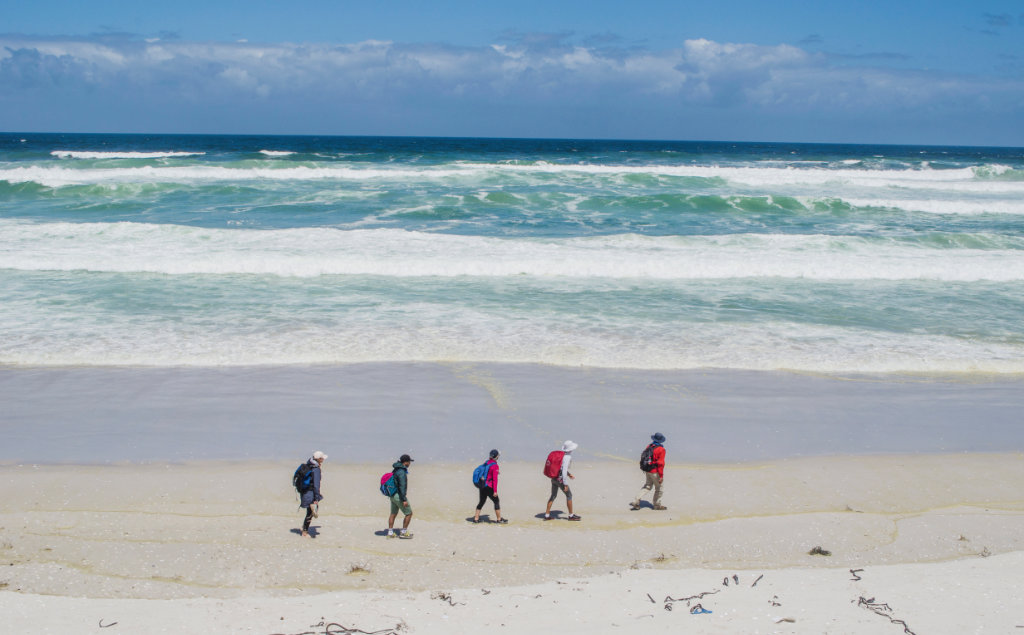
The beach shrinks to a sliver of soft, sinking-in sand at high tide. Image credit: Jessica Oosthuyse
It was comforting to know that help would be there in the unfortunate case we needed it, although deputy editor Catherine Hofmeyr (practically a West Coast local) mumbled that she’d rather die on the sand than be evacuated through the rough surf in a dinky rubber duck.
After a brief spell exploring Schaap Island, we trotted off to our overnight accommodation, Kariza Guest House, for an altogether different kind of challenge. Unlike the format of a traditional wine tasting, guide Nelda van Zyl tested and teased our tongues’ taste maps by coupling conflicting flavours like Chenin Blanc with soy sauce, and dessert wine with lemons. Needless to say, we were all delighted by the traditional Weskus flavours of creamy mussels and Cape Malay biryani for dinner.
We woke well before dawn to find that the weather had taken a turn for the worse, but we threw on our rain jackets and set off in high spirits despite the drizzle. Our guide Johnny van Rooyen explained that a lot of trash had been washed up onto the beach and suggested we take bin bags to clean up as we went along. Feeling optimistic, I tied two bags to my backpack and planned to log my efforts with the Ocean Conservancy’s International Coastal Cleanup initiative.

Washed-up ship fenders –possibly from the Pantelis A Lemos wreck – made for comfortable seats to rest our feet. Image credit: Lauren Dold
We skipped down the first three kilometres, stopping regularly for photos, to investigate seal pups, a cobra and other critters we spotted, and to fill our bags with plastic. But the soft sand started to take its toll and soon we settled into a slower rhythm.
I fell into step beside Johnny, who told me about the local community’s issues with unemployment and the rise in shellfish poaching. I was surprised to discover that he’d been unemployed prior to the launch of the 16 Mile Challenge. Now, thanks to the fundraising efforts of the community, Johnny is a qualified tourist-guide specialising in West Coast cultural hikes, including the Crayfish Trail from north of Velddrif to Lambert’s Bay.
Our group started to flag when we hit nine kilometres, and I took off my takkies. Not only were my socks soggy after being caught by the odd stray wave, my flat arches were aching and the sand felt good beneath my bare feet. While I no longer had to worry about the rising tide, I kept a careful eye out for the many bluebottle tentacles trailing down the sand.
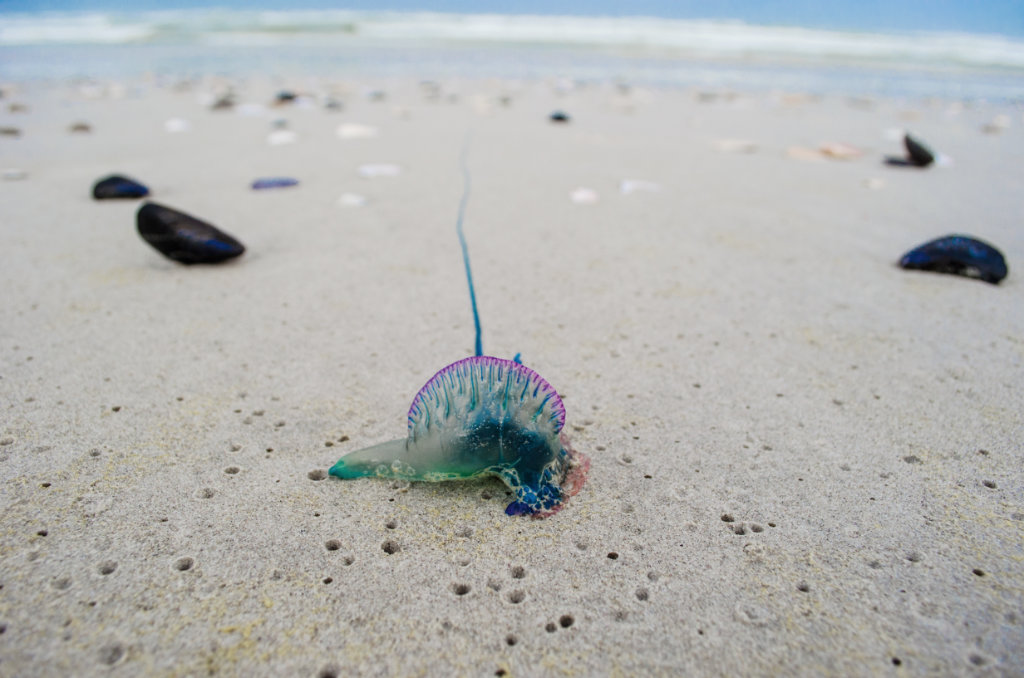
Take care if you’re walking barefoot, as bluebottle tentacles can still sting even when beached. Image credit: Achmat Booley
It was towards the halfway mark that things started to go downhill (only figuratively, unfortunately). My back hurt from the weight of my bag, laden with camera gear, clothes, sunblock, food and water, as well as two full bags of rubbish, and my calf muscles were cramping. But we all slogged on in determined silence until lunch where I was relieved to find that I wasn’t alone in my suffering.
‘It’s like that schlep back to the car after a long day at the beach,’ colleague Lauren Dold said between mouthfuls of Bar-Ones, biscuits and bananas. ‘You know, when you’re sandy, burnt and tired and have to carry all your clobber back up the dune? Except this dune never ends.
And yet, there was always the meditative loveliness of walking a wild, unpeopled beach, pounding breakers on one side, national park just above the dunes on the other, seagulls and terns rising in a flock ahead of our trudging feet. Archetypal West Coast.

Mussels thrive on the West Coast’s nutrient-rich currents. Image credit: Jessica Oosthuyse
With a salty haze obscuring the beach ends in both directions, we relied on smartwatches and shipwreck debris to estimate how far we still had to go. A once-74 000-ton Croatian bulk carrier, Pantelis A Lemos, was shipwrecked just south of Tsaarsbank in 1978. While the wreck has since been reclaimed by the Atlantic, some of its rusted remains can still be seen scattered along the shore.
The plastic persisted along the entire beach and I was eventually forced to abandon my clean-up pursuit. I felt like a failure, not only because my giving-up would disappoint my mother (who frowns upon such things) but because I had failed the ocean – 362-million square kilometres drowning in plastic, and I couldn’t even carry two full shopping bags along 28 kilometres of its shoreline. Thankfully, all the bin bags stored above the tideline are collected by a weekly ‘plastic patrol’, so my (small) effort was not entirely in vain.
Finally, 10 hours and 45 000 steps later, we crawled up to the Tsaarsbank picnic site in West Coast National Park, Karen’s beaming face and the glorious promise of beer coaxing us towards the finish line.
‘And so? How was it?’ she asked as we flopped down. Gazing back along the beach, I realised that the Challenge was about more than simply reaching the finish. It was a reminder of how humanity’s complacency had left even remote and protected areas like 16 Mile Beach littered with negligence. We may have finished our hike victorious, but the journey to ridding our beautiful beaches of trash has only just begun. And for eco-conscious hikers, this seemed like a good place to start.
But bear in mind, like I replied to our host, ‘This definitely isn’t a hike for sissies.’
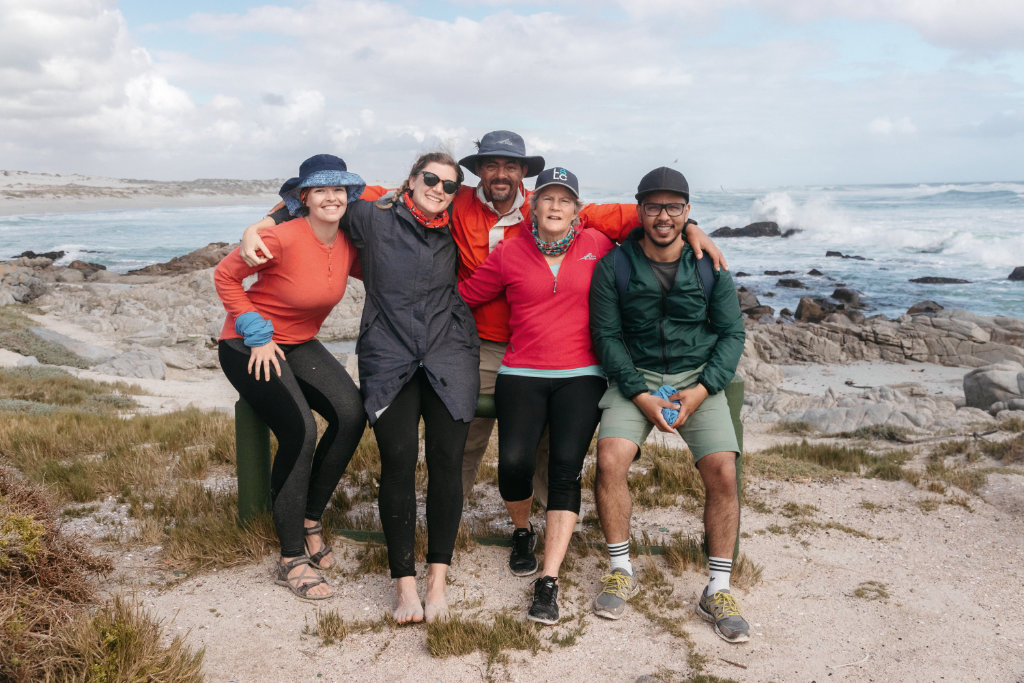
Battered and tired, yet all smiles at the finish line. Image credit: Lauren Dold
Plan Your Trip
Getting There
Yzerfontein is just over an hour’s drive from Cape Town on the R27 (87 km)
Join The Movement
Upload your beach clean-up efforts directly to the CleanSwell app, oceanconservancy.org. Help save lives by donating or volunteering at the NSRI, nsri.org.za.
Need To Know
Walk in trail sandals or running shoes and take a sturdy day- or backpack. Pack extra socks (in a watertight bag), raincoat, energy-rich snacks, a beach towel, sunscreen and hat, and at least two litres of water each.
Do It
More than a long beach walk, the Challenge is designed as a full West Coast experience – food, wine and lekka gesels-skap (chat). There’s a two-day (R2 395) or three-day (R2,920 per person) option for a minimum of seven people, all inclusive (excluding dinner drinks). 0861-321-777, [email protected], westcoastway.co.za

